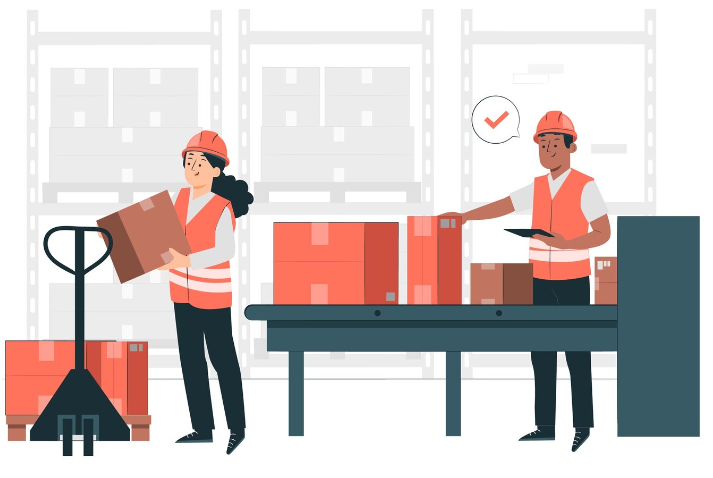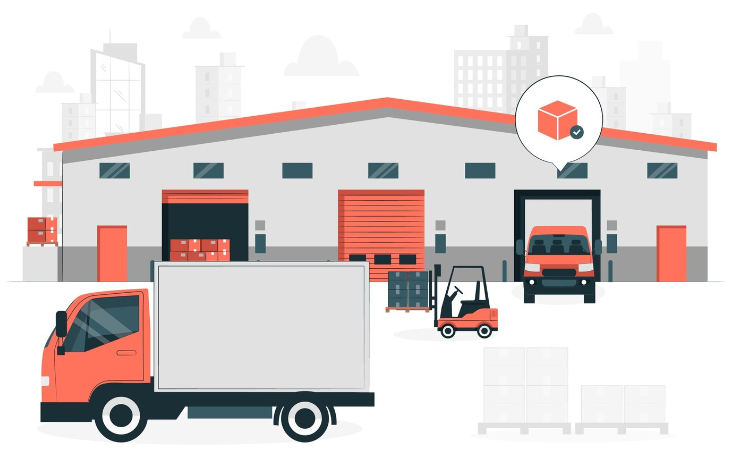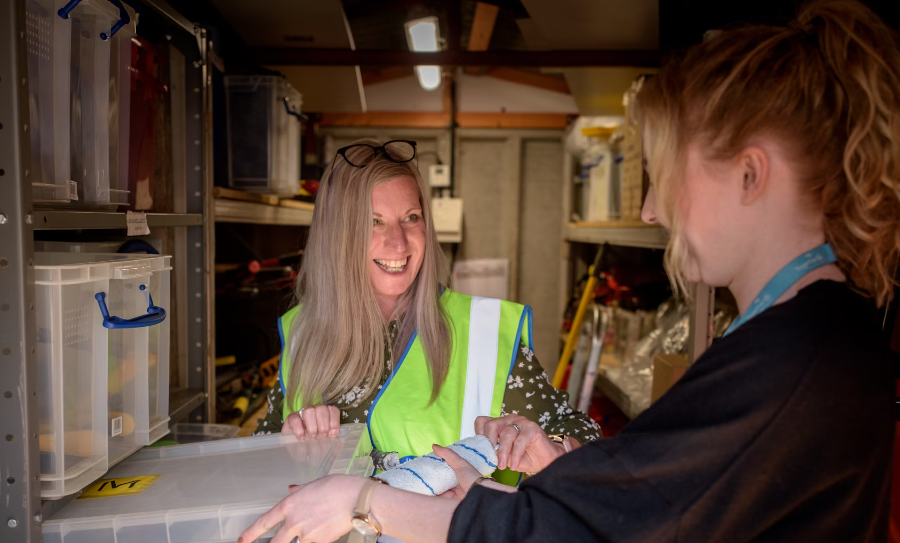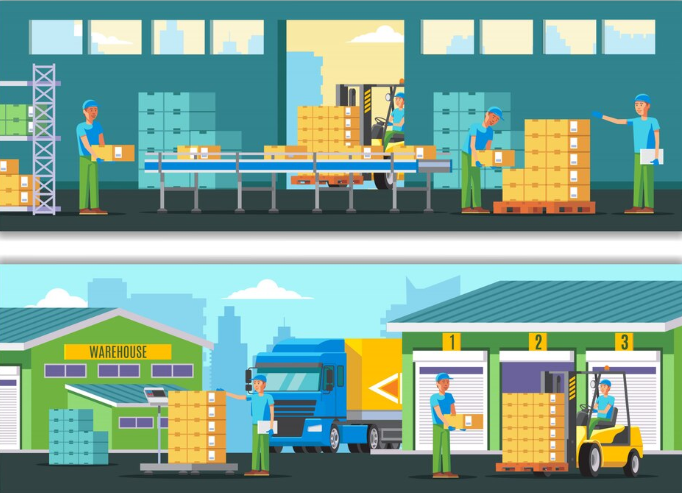Table of Contents
Get Custom eCommerce Fulfillment Service
Book a Meeting
What Is Ecommerce Fulfillment? The Definition, Process, and Benefits
Time: May 17,2024 Author: SFC Source: www.sendfromchina.com
Running a successful ecommerce business requires more than just selling great products; it demands an efficient order fulfillment process to keep customers happy and returning for more. Ecommerce fulfillment encompasses everything from receiving and managing inventory to processing orders, packing, shipping, and handling returns. Getting this process right is crucial for maintaining customer satisfaction and achieving business growth.
This blog article provides a deep dive into the essentials of ecommerce fulfillment, including how to choose the best fulfillment partner and the benefits of outsourcing. We’ll also review top service providers to help you streamline your operations and deliver exceptional customer experiences.

1. Ecommerce Fulfillment Definition
Ecommerce fulfillment is the process within the supply chain that involves receiving bulk goods, storing inventory, picking and packing orders, delivering products to customers, and managing returns. It includes all the steps required to get products from a warehouse to the end customer efficiently and accurately.The goal of ecommerce fulfillment is to efficiently manage a product's journey from the warehouse to the customer's doorstep, including inventory management, order processing, picking and packing, shipping, and handling returns.
2. What Are the Processes of Ecommerce Fulfillment

Receiving Inventory
The first step in ecommerce fulfillment is receiving inventory from suppliers. It involves checking the incoming products for quality and accuracy and storing them appropriately in a warehouse. Efficient receiving ensures that inventory levels are accurately recorded, which is crucial for the subsequent steps.Inventory Management
Effective inventory management is essential for maintaining optimal stock levels and ensuring products are available when customers place orders. The process includes tracking inventory, forecasting demand, and managing stock locations within the warehouse. Advanced inventory management systems can automate these tasks, reducing errors and improving efficiency.Order Processing
When a customer places an order, the fulfillment process begins with order processing. This step includes verifying payment, generating a pick list, and preparing the order for fulfillment. Streamlining order processing through automation and integrated systems can significantly reduce order turnaround times and enhance accuracy.Picking and Packing
Picking and packing involve selecting the ordered items from inventory and securely packing them for shipment. Picking and Packing is critical for ensuring that customers receive the correct products in good condition. Efficient picking and packing processes can improve order accuracy and speed up fulfillment.Shipping
Shipping is the final step in the ecommerce fulfillment process. It involves transporting the packed orders to customers using various shipping carriers. Choosing reliable shipping partners, negotiating competitive rates, and providing multiple shipping options can enhance customer satisfaction. Additionally, offering tracking information and ensuring timely delivery are essential for a positive customer experience.Returns Management
Efficient returns management involves handling customer returns promptly and effectively, including inspecting returned items, restocking them, and processing refunds or exchanges. A smooth returns process can improve customer satisfaction and encourage repeat business.3. How Do You Fulfill an Ecommerce Order

For small sellers, the process begins with storing products on shelves in a designated area, such as a garage. When an order is placed, the seller manually picks the items from their inventory, securely packs them in a box, and then takes the packed orders to a shipping carrier like the Post Office, FedEx, or UPS for delivery. The hands-on approach allows small businesses to manage their fulfillment needs directly, albeit on a smaller scale.
For larger enterprises, the process is more complex and involves advanced systems to handle higher volumes of orders efficiently. Fulfillment starts with receiving shipments or pallets of stock delivered to a fulfillment warehouse. The products are then added to a Warehouse Management System (WMS) and organized on shelves. When a customer places an order, integration between the ecommerce platform or order management software and the WMS ensures the order is transmitted almost immediately. The WMS generates a pick list, which a picker uses to pull the items from the shelves. A packer then secures the products in a box, and the 3PL hands the package off to a shipping carrier for delivery. The streamlined process ensures efficient and accurate fulfillment, even for large volumes of orders.
4. What Are the Advantages of Outsourcing Order Fulfillment

Cost Savings
Outsourcing to a third-party logistics provider can reduce costs associated with warehousing, labor, and shipping. 3PL providers often have established relationships with shipping carriers and can negotiate better rates.Scalability
A reliable fulfillment partner can scale operations to meet your business's growing needs. Whether you're experiencing seasonal spikes or long-term growth, a 3PL can adjust its resources accordingly.Focus on Core Business
By outsourcing fulfillment, you can focus on core business activities such as marketing, product development, and customer service. It allows you to allocate resources more effectively and drive business growth.Access to Expertise
3PL providers have expertise in logistics and fulfillment processes. They use advanced technology and best practices to ensure efficient and accurate order fulfillment, enhancing customer satisfaction.Improved Customer Experience
Outsourcing fulfillment can lead to faster and more reliable deliveries, which improves the overall customer experience. A positive fulfillment experience can increase customer loyalty and boost repeat business.5. How to Find a Reliable Ecommerce Fulfillment Partner

Evaluate Your Business Needs
Before you begin your search for an ecommerce fulfillment partner, it's crucial to evaluate your specific business needs. Consider factors such as your average order volume, the types of products you sell, shipping destinations, and any special requirements for storage and handling. Understanding your needs will help you identify a partner that can provide the right services and capabilities to support your business effectively.Research and Assess Potential Partners
Start by researching potential fulfillment partners with a proven track record in ecommerce fulfillment. Look for companies with experience in your industry and positive customer reviews. Assess their range of services, including warehousing, order processing, shipping, and returns management. It’s also important to check if they offer additional services that may be beneficial to your business, such as kitting, custom packaging, and international shipping.Technology and Integration Capabilities
A reliable fulfillment partner should have advanced technology and automation capabilities. Look for partners that offer robust WMS, real-time inventory tracking, and seamless integration with your ecommerce platform. The ability to integrate their systems with your order management software will ensure smooth and efficient order processing, reduce errors, and provide visibility into your inventory and order status.Flexibility and Scalability
Choose a fulfillment partner that can adapt to your changing business needs and scale its operations as you grow. Whether you experience seasonal spikes or long-term growth, a flexible partner should be able to accommodate fluctuations in order volume and expand their capacity when needed. The scalability ensures that your fulfillment operations can keep pace with your business without requiring significant additional investments.Shipping Capabilities and Carrier Relationships
Evaluate the shipping capabilities of potential fulfillment partners. They should offer a variety of shipping options, including standard, expedited, and international shipping. Additionally, partners with strong relationships with major carriers can often negotiate better shipping rates, which can be passed on to you and your customers. Ensure they provide reliable shipping services and have a track record of meeting delivery timelines.Quality of Customer Support
Effective customer support is essential for addressing any issues that may arise during the fulfillment process. Choose a partner that offers responsive and knowledgeable customer support. The support should be available to assist with inquiries, resolve problems, and provide timely updates on order status. Excellent customer support can help maintain a positive relationship with your customers and ensure a smooth fulfillment experience.Evaluate Costs and Contracts
Cost is an important consideration when selecting a fulfillment partner. Request detailed pricing information from potential partners, including any setup fees, storage costs, pick and pack fees, and shipping rates. Compare these costs to determine which partner offers the best value for your needs. Additionally, review the terms of the contract carefully, including any minimum volume requirements, contract length, and termination clauses.Visit Their Facilities
If possible, arrange to visit the fulfillment partner’s facilities. A site visit allows you to see their operations firsthand, assess their infrastructure, and meet their team. The visit can provide valuable insights into their capabilities, efficiency, and overall suitability for your business. It also allows you to ask detailed questions and address any concerns you may have.6. Top 8 Ecommerce Fulfillment Service Providers

Amazon FBA (Fulfillment by Amazon)
Amazon FBA offers comprehensive fulfillment services, including warehousing, picking, packing, and shipping. It provides access to Amazon's vast logistics network and Prime shipping benefits.ShipBob
ShipBob is a popular 3PL provider that offers end-to-end fulfillment services. It integrates with major ecommerce platforms and provides real-time inventory tracking and order management.Rakuten Super Logistics
Rakuten Super Logistics offers scalable fulfillment solutions, including same-day shipping and international fulfillment. It uses advanced technology to optimize order processing and shipping.Fulfillment.com
Fulfillment.com provides global fulfillment services, including warehousing, order processing, and shipping. It offers integration with major ecommerce platforms and real-time tracking.Red Stag Fulfillment
Red Stag Fulfillment specializes in handling heavy and oversized products. It offers accurate and reliable fulfillment services, with a focus on quality and customer satisfaction.eFulfillment Service
eFulfillment Service provides affordable and flexible fulfillment solutions for small to medium-sized businesses. It offers no long-term contracts and a straightforward pricing model.Deliverr
Deliverr offers fast and affordable fulfillment services, with a focus on two-day delivery. It integrates with major ecommerce platforms and marketplaces, providing seamless order processing.SFC (Send From China)
SFC provides comprehensive fulfillment services for ecommerce businesses sourcing products from China. It offers warehousing, order processing, shipping, and returns management, with a focus on efficient and cost-effective solutions.7. Outsourcing Fulfillment to SFC
SFC stands at the forefront of order fulfillment with cutting-edge facilities in Shenzhen and Yiwu, China. Utilizing sophisticated software, we specialize in seamless and trustworthy fulfillment solutions for ecommerce, dropshipping, and crowdfunding platforms. At SFC, we are dedicated to accelerating your business growth through secure warehousing, efficient processing, customizable packaging options, and adaptable shipping strategies, all while saving you time and money.Whether you have or do not have a fulfillment partner, particularly your products manufactured in China, you should consider SFC. Click the button below and get help from SFC logistics experts.
What Makes SFC Special
Over 17 years 3PL and order fulfillment experienceDDP (Delivered Duty Paid) Service
All-in-one tracking number
API
30 days of free storage
No hidden fee
Custom packaging
Worldwide shipping solutions
8. FAQs About Ecommerce Fulfillment
1. What is ecommerce fulfillment?
Ecommerce fulfillment refers to the process of receiving, processing, and delivering online orders to customers. It includes inventory management, order processing, warehousing, shipping, and handling returns.2. How does third-party logistics (3PL) work?
Third-party logistics providers offer comprehensive fulfillment services to ecommerce businesses, handling tasks such as warehousing, order processing, shipping, and returns. Businesses outsource these functions to 3PL providers to benefit from their expertise, infrastructure, and technology.3. What are the benefits of using a 3PL provider?
Benefits of using a 3PL provider include cost savings, improved efficiency, access to advanced technology, scalability, and the ability to focus on core business activities while leaving fulfillment tasks to experts.4. How can I improve my ecommerce fulfillment process?
To improve your ecommerce fulfillment process, consider implementing advanced inventory management systems, automating order processing, optimizing warehousing solutions, choosing reliable shipping carriers, and providing excellent customer support.5. What are the key trends in ecommerce fulfillment?
Key trends in ecommerce fulfillment include the adoption of automation and robotics, increased focus on sustainability, and the rise of personalization and customization in fulfillment processes. Post Views:19465
Post Views:19465
Copyright statement: The copyright of this article belongs to the original author. Please indicate the source for reprinting.
Previous Post
Third Party Logistics Definition, Process, and Advantages
Next Post
TAGS
Hot Research
Get Custom eCommerce Fulfillment Service
Book a Meeting
Get a Custom China Fulfillment Solution with FREE Storage for 30 Days
 Want to know about our services, fees or receive a custom quote?
Want to know about our services, fees or receive a custom quote?
 Please fill out the form on the right and we will get back to you within a business day.
Please fill out the form on the right and we will get back to you within a business day.
 The more information you provide, the better our initial response
will be.
The more information you provide, the better our initial response
will be.






 TAGS:
TAGS: